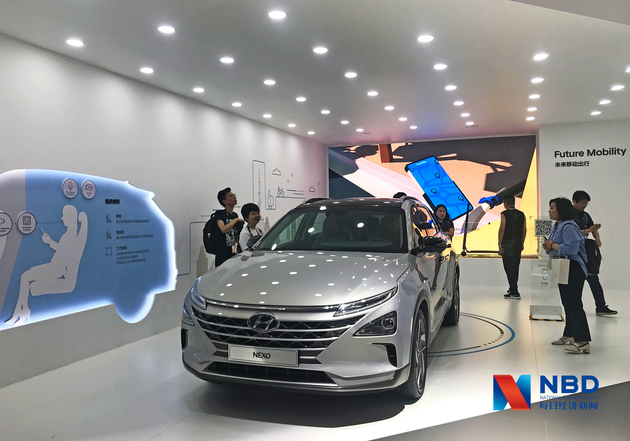
Hyundai's hydrogen fuel cell powered crossover SUV NEXO [Photo/Qu Maomao (NBD)]
Sept. 30 (NBD) -- South Korea's top automaker Hyundai Motor Co., Ltd. (Hyundai, OTCMKTS: HYMTF) intends to turn its commercial vehicle joint venture Sichuan Hyundai Motor Co., Ltd. (Sichuan Hyundai) into a wholly-owned subsidiary through buying out its Chinese partner's stake in 2020, based on a recent statement by Sichuan Hyundai.
"Gaining the full ownership of Sichuan Hyundai could help Hyundai better develop commercial vehicles in the Chinese market," a spokesperson for the joint venture said to National Business Daily (NBD) on September 26.
In the future Sichuan Hyundai will place a focus on the research & development of hydrogen fuel cell-powered vehicles, which are encouraged by the Chinese government. Hyundai's advanced hydrogen fuel cell technologies are expected to be employed in commercial vehicles as long as the South Korean automaker takes the full ownership of the joint venture.
Sichuan Hyundai, if the deal proceeds smoothly, would become China's first wholly foreign-owned commercial car enterprise after the country lifts up the restriction on foreign ownership of automakers. Back in April 2018, the National Development and Reform Commission announced that China will scrap limits on foreign ownership for manufacturers of electric cars in 2018, commercial vehicles in 2020, passenger cars in 2022.
The Sichuan-based entity was founded in August 2012 by Hyundai and Sichuan Nanjun Automobile Group Co., Ltd. (Nanjun Auto), with each holding a 50 percent stake. The company served as Hyundai's headquarters for marketing & sales of commercial vehicles in China.
Previous reports showed that Nanjun Auto exited the joint venture in August this year, and the largest shareholder of Sichuan Hyundai is now a Sichuan-based real estate company, which owns a 67.27 percent stake.
Hyundai's move to take full control of Sichuan Hyundai is not only an answer to China's new policy, but is likely related to the predicament facing the Sichuan-based company.
"In recent years, both sales and financial results of Sichuan Hyundai were unsatisfactory. It is difficult for both sides of the joint venture to reach consensus on the business operation," said an industry analyst to NBD.
In 2016, Sichuan Hyundai added 33.7 percent in sales to 39,600 units from the year-ago period. Last year, the company set its sales target at 30,000 units, a significant drop from the 45,000-unit goal for 2017, which indicated the poor sales in the previous year.
"Sichuan Hyundai is expected to sell 30,000 units in 2020. To achieve the goal, it will launch new models, expecting to become the leader among Chinese commercial vehicle brands by 2025," stated the company's general manager.
Email: lansuying@nbd.com.cn


 川公网安备 51019002001991号
川公网安备 51019002001991号





